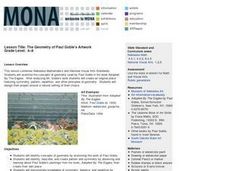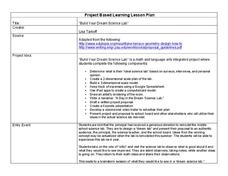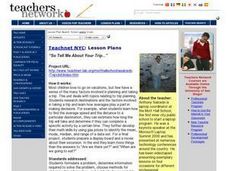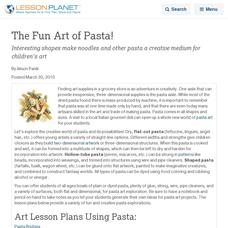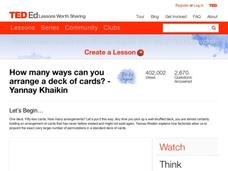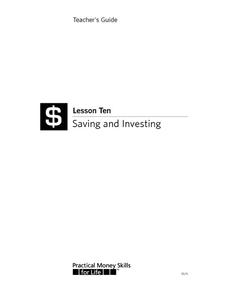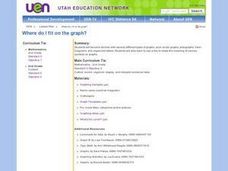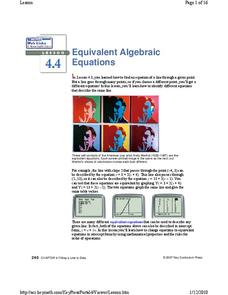Curated OER
Re-Presenting Race in the Digital Age
Teen-aged scientists analyze a graphic organizer of how trash is removed from New York City and then answer standard questions about a graph and a diagram. Resources are mentioned, but there are no links to these resources, so you will...
Curated OER
The Geometry of Paul Goble's Artwork
Students examine the concepts of geometry used by Paul Goble in his book Adopted By The Eagles. After analyzing Mr. Goble's work they create an original piece featuring symmetry, pattern, repetition, and other principles of geometry....
Curated OER
Build Your Dream Science Lab
Would your ideal science lab be filled with bubbling beakers and zapping Tesla coils? Or would it contain state-of-the-art computer technology and data analysis? Dream big with an innovative lesson that connects math and language...
Curated OER
Simplifying Radicals
For this Algebra I/Algebra II worksheet, students simplify radicals and radical expressions involving multiplication and division. The one page worksheet contains a combination of nine multiple choice and free response...
Curated OER
Crazy for Cubes: Art and Science
Learners discuss Sol LeWitt and conceptual art, then analyze the differences in expressing a concept through model-based inquiry and aesthetic art criticism. They develop a geometric, scientific, or mathematical concept, then create an...
Curated OER
What's Your Symbol?
Sixth graders investigate how colors, objects and geometric shapes have been used symbolically in art during specific time periods. They use this information to create symbolic artwork and write a descriptive/informational piece...
Curated OER
"So Tell Me About Your Trip..."
Pupils research destinations and the factors involved in taking a trip and explore how averages play a part in making decisions. They explore how to find the average speed and the distance to a particular destination, they estimate how...
Curated OER
The Renaissance
In this Renaissance worksheet, students read a 2 page article covering The Renaissance period, answer 5 facts with multiple choice answers and answer 5 statements true or false.
Curated OER
Recording Artist and MP3 Players
Students explore the concept of being a recording artist. In this recording artist lesson plan, students determine the costs of producing various music products such as a demo tape, 8-track tape, and a record deal. Students discuss...
Curated OER
Tulip Maze
In this artistic activity, students practice unique ways to find the most efficient way to get through a tulip maze. Students defend their choices to each other.
Curated OER
The Fun Art of Pasta!
Interesting shapes make noodles and other pasta a creative medium for children’s art
Curated OER
Geo Jammin' By DeSign - Day 1, Lesson 6: Quilt Story
Learners recognize that quilts are created by geometric components. They examine how quilts are an artistic art form that show the cultural heritage of the people who make them.
TED-Ed
How Many Ways Can You Arrange a Deck of Cards?
Entertain and grab your learners' attention with a short video clip that engagingly teaches the concept of a permutation and how a factorial is a wonderful shortcut for theoretical probability calculations.
Bowland
My Music
Scholars investigate how the tempo of music affects heartbeats. Groups develop hypotheses about music and its connection to heartbeats before carrying out an experiment. They analyze and present data from their investigations.
Visa
Saving and Investing
Impress upon your young adults the importance of saving and investing, and give them a foundational vocabulary from which they can continue to build their financial literacy. This lesson plan covers short- and long-term budget goals,...
Curated OER
Human Abstraction
Students explore and compare abstraction of human forms in various ancient cultures and by creating self-portraits using geometric shapes. They identify which geometric shapes form the following features: face, nose, arms, torso, legs,...
Curated OER
Where Do I Fit on the Graph?
Students collect data and create graphs about themselves, their community, and the world around them. They use a variety of methods to organize data, such as stickers, clothespins, name tags, coloring, tally marks, etc.
Curated OER
Math: Graphs and Their Symbols
Second graders examine different types of graphs and discover the meanings of the symbols used on them. After gathering data about themselves, their communities, and the world, they use that information to create graphs. Among the...
Curated OER
Equivalent Algebraic Equations
Ninth graders explore linear equations. In this Algebra I lesson plan, 9th graders investigate how different equivalent equations can be used to describe any given line. Students explore how to change equations to equivalents...
Curated OER
Counting Techniques
In this counting worksheet, students solve fifteen counting exercises using the appropriate counting technique. Solutions are provided on the last page.
Curated OER
Teaching the Toki Kaku Dako
Students complete various readings and decorating, constructing, and flying a kite. They analyze how the parts of a system to together. Students comprehend the concept of area.
Curated OER
Math is Beautiful: Tessellation
Students examine patterning in Chinese and Japanese artwork prior to creating their
own tessellations using styrofoam plates in this creative cross-curricular lesson for upper-elementary/middle level classrooms.
PBS
Pbs Learning Media: Math + Arts: Dragon Scales
In this lesson plan, students create a class mural by using scale, ratio, and proportion. Media resources and teacher materials are included.

